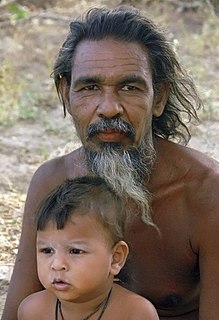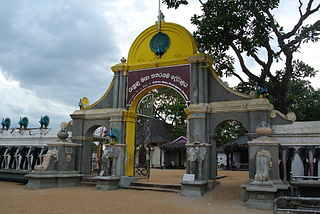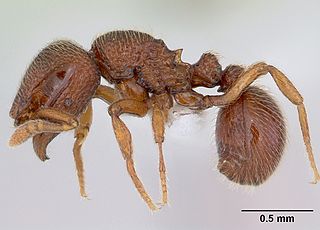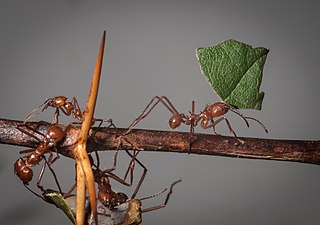
The Vedda are a minority indigenous group of people in Sri Lanka who, among other self-identified native communities such as Coast Veddas, Anuradhapura Veddas and Bintenne Veddas, are accorded indigenous status. The Veddha minority in Sri Lanka is in threat of becoming extinct. Most speak Sinhala instead owing to near-extinction of their indigenous languages.
The Myrmidons were legendary people of Greek mythology, native to the region of Thessaly. During the Trojan War, they were commanded by Achilles, as described in Homer's Iliad. According to Greek legend, they were created by Zeus from a colony of ants and therefore took their name from the Greek word for ant, myrmex.
Kuveni(කුවේණි) also known as Sesapathi or Kuvanna, was a Yakshini queen in Sri Lanka mentioned in the ancient Pali chronicles Mahavamsa and Dipavamsa of the Sinhalese people. The primary source for her life-story is the Mahavamsa. She is venerated as Maha Loku Kiriammaleththo by the Veddas. Other names for her varying with Veddas habitats are Indigolle Kiriamma, Unapane Kiriamma, Kande Kiriamma, Divas Kiriamma, Wellasse Kiriamma, Kukulapola Kiriamma and Bili Kiriamma.
Dimbulagala also known as Gunners Rock during the British colonial period, is a rock formation in the Polonnaruwa District of Sri Lanka. By the time anthropologist Charles Gabriel Seligman visited the location in 1911, a cave within the rock had become a refuge of the indigenous Vedda people. During the 12th century AD, The Sinhalese people had constructed a Buddhist monastery within the rock formation. The Dimbulagala Raja Maha Vihara monastery was restored in the 1950s. The villagers around the rock are of mixed Vedda and Sinhalese ancestry.

Crematogastrini is a tribe of myrmicine ants with 64 genera and 8 fossil genera.
Vedda/væđđā/ is an endangered language which is used by the indigenous Vedda people of Sri Lanka. Additionally, communities such as Coast Veddas and Anuradhapura Veddas, that do not strictly identify themselves as Veddas also use words from the Vedda language in part for communication during hunting and or for religious chants, throughout the island.

The Coast Veddas, by self-designation, form a social group within the minority Sri Lankan Tamil ethnic group of the Eastern province of Sri Lanka. They are primarily found in small coastal villages from the eastern township of Trincomalee to Batticalao. Nevertheless, they also inhabit a few villages south of Batticalao as well. They make a living by fishing, slash and burn agriculture, paddy cultivation of rice, basket weaving for market and occasional wage labor. Anthropologists consider them to be partly descended from the indigenous Vedda people, as well as local Tamils. Residents of the Eastern province consider their Vedar neighbors to have been part of the local social structure from earliest times, whereas some Vedar elders believe that their ancestors may have migrated from the interior at some time in the past.

Kataragamam temple in Kataragama, Sri Lanka, is a temple complex dedicated to Buddhist guardian deity Kataragama deviyo and Hindu War God Murugan. It is one of the few religious sites in Sri Lanka that is venerated by the Buddhists, Hindus, Muslims and the Vedda people. For most of the past millennia, it was a jungle shrine very difficult to access; today it is accessible by an all-weather road. The shrines and the nearby Kiri Vehera are managed by Buddhists, the shrines dedicated to Teyvāṉai and Shiva are managed by Hindus and the mosque by Muslims.

Kataragama is a pilgrimage town sacred to Buddhist, Hindu and indigenous Vedda people of Sri Lanka. People from South India also go there to worship. The town has the Kataragama temple, a shrine dedicated to Skanda Kumara also known as Kataragama deviyo. Kataragama is located in the Monaragala District of Uva province, Sri Lanka. It is 228 km ESE of Colombo, the capital of Sri Lanka. Although Kataragama was a small village in medieval times, today it is a fast-developing township surrounded by jungle in the southeastern region of Sri Lanka.
Anuradhapura Veddas are people of North Central Province of Sri Lanka who are descendants of indigenous Vedda people of Sri Lanka who have adopted the culture, religion and language of the dominant Sinhalese residents of the province. By far they are the largest segment amongst the various groups of people who claim Vedda ancestry. They are also ethnically related to Tamil speaking Coast Veddas who live in the minority Sri Lankan Tamil dominant Northern Province of Sri Lanka who have adopted Tamil and Hindu cultural norms of their neighbors. Settlements of Anuradhapura Veddas also spread into the neighboring Polonnaruwa District and a few villages in the interior of the Trincomalee District.
Wesleyan Methodist Mission, North Ceylon was formed as part of the Wesleyan Methodist Mission of Ceylon, the oldest Weslyan Mission to be established in East in 1814. The North Ceylon Mission was established to specifically cater to the Tamil speaking Sri Lankans in Jaffna, Trincomalee and Batticaloa where Methodist Missionaries established number of schools and churches. It also catered to the indigenous Vedda people.

Calyptomyrmex is a genus of ants in the subfamily Myrmicinae. The genus is distributed from Africa to India and east to New Caledonia. They are mainly found in the rainforest, where they forage alone or in small numbers.

Dicroaspis is an African genus of ants in the subfamily Myrmicinae.
Calyptomyrmex singalensis, is a species of ant in the subfamily Myrmicinae, which can be found in Sri Lanka.
Calyptomyrmex tamil is a species of ant in the subfamily Myrmicinae, which can be found in Sri Lanka.
Dambana, a village within the Badulla District in Sri Lanka. It is closest to the town of Mahiyangana. It is known as the refuge of the indigenous Vedda people as well as their moribund Vedda language. It is well known for its eco-tourism projects, operated by Eco Team. In 2010 it had population close 1000 individuals all belonging to Vedda families.








